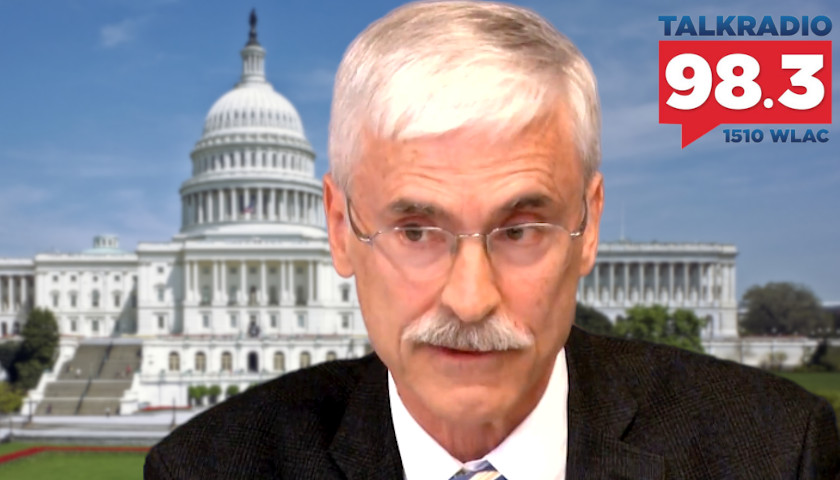Fellow at the Center for Immigration Studies Don Barnett joined The Tennessee Star Report with Michael Patrick Leahy – broadcast on Nashville’s Talk Radio 98.3 and 1510 WLAC weekdays from 5:00 a.m. to 8:00 a.m. – Monday morning on the newsmakers line.
During the third hour, Barnett detailed his recent trip to and from Russia and how he was discouraged to see no special treatment for coronavirus temperature screening upon arrival at US customs.
Leahy: We are joined now by our good friend and fellow at the Center for Immigration Studies. A resident of Middle Tennessee. Occasional contributor to the Tennessee Star, Don Barnett. Good morning Don.
Barnett: Good morning Mike.
Leahy: Now you have had an adventure before all this blew up. You left the United States and traveled to Russia in March. When did you leave?
Barnett: About March 15th. I wound up spending a week in the southern part of Russia in the mountainous area of Caucuses. Then a week in Moscow. I cut my trip short by a couple of days in fear that we might be trapped inside the country.
We basically spent two weeks there. Airports were filled with a lot of people that had been trapped there from other countries. Luckily we did get out. Not everyone did.
Leahy: Now your wife is a native of Russia is that right?
Barnett: No, not really. She is from a family that fled (Inaudible).
Leahy: OK. That’s right. Got it.
Barnett: That was part of the Soviet Union for a while. Yes, there is definitely a Russian connection there.
Leahy: So you had a couple of decisions. You had a go no go decision. I guess at the time you had purchased these tickets. And at that time we weren’t quite sure how rapidly the coronavirus would spread. So you landed in Russia. What do you see when you land in Russia in terms of their dealing with the coronavirus.
Barnett: Well they aren’t handling it well. They are kind of going along the same path that we are with schools being closed. People encouraged to work from home. And about 100 thousand Russians are trapped outside of Russia now.
And people who were trying to leave Russia and go back. Russia uses temporary workers much like the way we do. There were quite a few from Uzbekistan and Kazakhstan which are now separate countries.
And there were quite a few from these countries and they were saying no we’re not taking any flights from Russia. So they were basically living in airports in Moscow. But in general, I would say it’s not quite as locked down as we are. For instance, we were on the Metro quite a bit.
The city streets were filled with people. Not as much as usual I was told. Now one interesting theory and all kinds of theories are circulating around this as you can imagine here as well as there. April 22nd they are voting on a constitutional amendment which is going to increase Putin’s power quite a bit.
Supposedly one of the motivations for locking down meetings because they sopped even small meetings and open-air meetings to deflect protest as they get closer to that date of April 22nd. So that’s going on there.
Leahy: Let me ask you this Don. How is Russian media? How are they reporting on coronavirus there? I’ve not seen any data about how many cases there are in Russia.
Barnett: Well actually about the entire country of Russia is reporting close to what the entire state of Tennessee is reporting.
Leahy: Do you believe that?
Barnett: No I don’t. In fact, I heard from a nurse that from her director they were told if they encounter coronavirus to code it and list it as something else like the flu.
Leahy: Aaaah.
Barnett: So they are definitely under-reporting it. At least I feel we can make that statement if they are underreporting it. And basically a couple of people have said once April 22nd has passed we’ll see. We have a lot of coronaviruses as well.
But right now Russia is one of the low case scenarios for this virus. And that’s definitely not the case. But in general, people seem to be less concerned. There are coffee shops that are still open and people are sitting around and things like that.
It definitely slowed down dramatically but not completely slowed down as we seemingly have. When I flew into JFK it was completely empty. From JFK to Nashville there were five people on my flight.
Leahy: So you flew from Moscow directly to the JFK?
Barnett: Right. JFK.
Leahy: When did you land in JFK?
Barnett: I landed at JFK local time at about 10 am.
Leahy: Which day?
Barnett: That was Saturday. So it should be a really good day. And I was there for nine hours. I was waiting for nine hours. That was the only flight I could get. Literally I could scan virtually a quarter mile down the waiting area and there would be no soul. As I said, when I left and finally got on a flight from JFK to Nashville there were only five other people on the entire airplane.
Leahy: So when you cleared customs here at JFK having flown directly from Moscow, did you go through any different protocols. Did, they take your temperature?
Barnett: No. No, they didn’t. In fact, we filled out a form that basically asked how do you feel? Do you have a temperature?
Leahy: I feel great! (Chuckles)
Barnett: I think I have the flu. But if you wanted to you could say you felt great. Also, it asked if you have been to any of these countries in the last 14 days? Didn’t mention Russia?
Leahy: Are you kidding me?
Barnett: No, it didn’t. They’re listed as a low incident country now.
Leahy: Because they are not reporting it and coding it incorrectly.
Barnett: Right. That’s exactly right. So Russia wasn’t on the list. So I didn’t get any special treatment. And that was it. I just showed my signed paper saying that I had not been into Iran, or Italy or any of the high volume countries.
And they said OK go on. They didn’t even do the remote temperature measurement that you see where they take the temperature on the forehead. They didn’t even do that. And that was it.
Leahy: It would seem to me Don that a protocol to do that remote temperature of everybody coming off an international flight would make sense right?
Barnett: Yes. I was surprised they are not doing that.
Leahy: Oh boy.
Barnett: And the flight from Moscow to JFK was about two thirds full. And it was mostly Russian speaking immigrants that had citizenship and returning home to the United States. It was mostly Russian speaking groups and a handful of Americans.
Leahy: You kind of get the feeling that oh yeah these Russian immigrants went back to Russia and we don’t know what they got there. But whatever they’re bringing back!
Barnett: No. I would say we don’t have a good feel. And Russia has banned even outdoor meetings of more than 50 people. And again people are saying to head off any protests against the culminating of the referendum of the constitutional amendment. Museums are closed and everything.
Leahy: Now that you’re back in the country Don, do you think it would be a good idea to shut off all international flights coming to the US?
Barnett: By the way, Russia did shut off all flights from China. That is an action that they took very early on. It turns out the Chinese tourists were supporting a lot of the tourist industry in Moscow.
As far as shutting off international flights I think they should be slowed down but its almost impossible to consider that there are still Americans trying to get home from various places around the world and still high-level diplomatic contacts. Business contacts and things like that. They are greatly curtailed. They are already greatly curtailed. As far as shutting them off completely seems almost impossible.
Listen to the third hour:
– – –
Tune in weekdays from 5:00 – 8:00 a.m. to the Tennessee Star Report with Michael Patrick Leahy on Talk Radio 98.3 FM WLAC 1510. Listen online at iHeart Radio.





